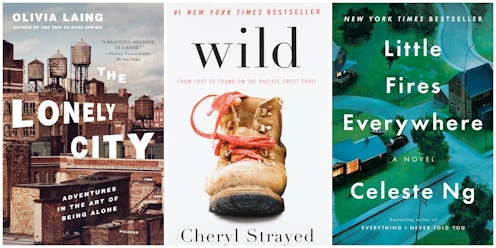
We are taught that there is shame in being alone. For women, in particular, there lurks the implication that no one is ever willingly by themselves. There's this idea that o one wants to be single (and if they say they do, they're just kidding themselves) or that no one wants a life that is truly untethered. "Find me a husband!" has been at the center of book, movie and TV plots for centuries. But part of growing up — er, maybe not even "up," but "out" — has been learning to love singularity. These books taught me how to be alone - and why there's power in loneliness.
Though it took until I was out of college to realize this tendency, I have always fallen into a lifestyle of independence. I bought my own prom ticket my senior year (and some classmate's mom looked at me pityingly and said, "Just one?"). I had moved to two new cities, without much of a plan, twice by the time I was 21. And it wasn't until other people started pointing out that I'm the opposite of a serial monogamist, that I take (to them, oddly) long walks by myself and show up to parties by myself and eat meals in public by myself, that I began to feel ashamed of being alone, of loneliness. I downloaded all the dating apps, I began spiraling into depression. I started relying on other people to do my own emotional lifting. And then I started reading books about women who refused to shut up about the intricacies of loneliness.
As an extrovert, the process of loving alone time has been particularly challenging. I do gain energy from being in the company of others. I love to chat and socialize. But as Warsan Shire sagely wrote, "You can't make homes out of human beings." This reading list helped me learn that.
'The Lonely City' by Olivia Laing
I recently picked up a copy of Olivia Laing's The Lonely City and couldn't put it down. Maybe it's because I just moved to New York, as she once did in her mid-thirties, and books about the city have taken on a new meaning for me. Maybe it was that I was coming off a solo walk across town, as I so often do when trying to orient myself to a new neighborhood.
Through the lens of artists known and lauded for their handling of loneliness — Edward Hopper, Andy Warhol, David Wojnarowicz — Laing walks us, and herself, down a path of self-reflection regarding why we fear being alone and the ways in which we can reclaim the feeling.
'Their Eyes Were Watching God' by Zora Neale Hurston
I first read Hurston's Their Eyes Were Watching God early on in high school, and I had never, ever encountered a character like Janie Crawford, the fiercely independent woman at the center of Hurston's well-renowned novel. Janie fights for the right to self-definition, tirelessly and unapologetically. She makes room for herself in spaces where men dominate. And when she reflects on a life she's run ragged trying to figure things out for herself, she's content.
Now, admittedly, this book, written by a Black woman, for Black women, about the experience of being a Black woman in the South, was not made for me. And there is a spirit to this book that I won't ever know or truly understand, and Janie must overcome things that I will never have to encounter because of my privilege. But I do understand loneliness, and living in a world where people question your independence, and it's those elements of Janie that I continue to cherish.
'Wild' by Cheryl Strayed
There's a reason why Cheryl Strayed's now-classic memoir Wild is on, like, every single person's "Independence" reading list — it's because the power of Strayed's writing and story are undeniable. I read this book twice my first year out of college, when I was living in a new city, in a new state, working a new job and knowing absolutely no one. I didn't hike across the West Coast, but I was learning how to exist, fully, by myself, on my own. Get a meal by yourself and read this book and work on being okay, truly, as a singular person.
'Braving The Wilderness' by Brene Brown
Brene Brown is the queen of making you get emotional on public transportation. In Braving the Wilderness, Brown takes on the concept of belonging — and how devastating it is, in our society, when you feel a lack of acceptance into a group. Spoiler: you don't have to belong to a single place or group. You can define self-worth all on your own.
'A Field Guide to Getting Lost' by Rebecca Solnit
Rebecca Solnit is perhaps best known for her essay collection Men Explain Things To Me (and it's understandable why — great title, killer commentary), but her memoir-heavy collection on loneliness A Field Guide to Getting Lost is an incredible work of honesty and personal reflection.
'The Year of Magical Thinking' by Joan Didion
Within the space of two years, Joan Didion lost both her husband and her daughter. The Year of Magical Thinking covers what comes after the loss of John Gregory and before the loss of Quintana. She writes about what grows when the ground has been scorched, when your world has shattered, and when you are the last one standing.
'Little Fires Everywhere' by Celeste Ng
Though she's not the protagonist of Celeste Ng's 2017 novel Little Fires Everywhere, Mia Warren, who lives her life in self-imposed isolation with her daughter, Pearl, is a vision of survival. She wields loneliness as a weapon, as a defense mechanism. And Ng's handling of Warren's past makes you reconsider what being "alone" looks like.